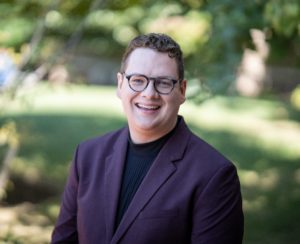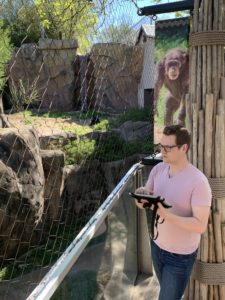SoTL Project Spotlight: Jake Funkhouser (Anthropology)
The Scholarship of Teaching & Learning Can Inform an Inclusive Future of Science
 Jake Funkhouser
Jake Funkhouser
Ph.D. Candidate, Department of Anthropology
SoTL Seminar Participant in Spring 2022
For decades, undergraduate students in Behavioral Research at the Saint Louis Zoo have independently designed and executed an authentic research project in animal behavior and ecology. Since Professor Robert Sussman’s originating idea, the course has been offered at least 50 times over the last 45 years. Today, we call this type of curricula a course-based undergraduate research experience (CURE). CUREs have been documented in research to benefit students in many ways, including increased learning, science literacy, and sense of place. Additionally, in teaching this course with Professor Crickette Sanz, we have come to recognize it as a unique opportunity to overcome barriers that have historically excluded many underrepresented minority students from participating in field and independent research experiences in the life sciences: e.g., time to engage in unpaid opportunities, access to research materials, research funds, advisement, mentorship, support, and/or ability to travel to and safely navigate the field. In my research, I wanted to know if this type of curriculum has the potential to not only help students feel included while in class but also to retain scholars of historically excluded identities in the sciences by shifting students’ belief in their capabilities to engage in scientific inquiry and feelings of anxiety about engaging in science. These are just two of many constructs that likely act as mechanisms of exclusion in the sciences. Over two semesters of online and in-person instruction of Behavioral Research at the Saint Louis Zoo, our students’ beginning- and end-of-semester reflections indicated this CURE curriculum positively impacted their confidence to successfully engage in science-related activities. Further, narrative responses support the idea that this CURE decreased students’ feelings of anxiety toward science and increase their feelings of inclusion of self in science. Therefore, our research suggests that CUREs have the potential to overcome both structural and intrapersonal barriers that have historically excluded underrepresented identities from the sciences.
 I found this unique opportunity to engage with the scholarship of teaching and learning as a transformative source of growth. As a historically excluded identity in science myself, the idea of using pedagogy rooted in empiricism to cultivate a more inclusive and diverse future for the sciences is exciting! This experience has allowed me to envision my teaching as an avenue for scientific discovery and an engine of disciplinary growth. I now see my classrooms as a place for science rather than simply a room where science is discussed. Throughout the process of developing and implementing this project, the lines burred between my own research and this newfound endeavor to study the impact of my teaching. In my mind, syllabi started to look like experimental design, lectures and in-class activities as methodology, and assignment submissions represented experimental results. Suddenly, I understood my teaching to be the independent variable that influence my students’ thoughts, feelings, and attitudes about science as well as their learning. In the analysis and dissemination of these results my own skills as a scientist expanded as I tackled scale-rated data, grappled with qualitative themes, and wrote to an entirely new audience.
I found this unique opportunity to engage with the scholarship of teaching and learning as a transformative source of growth. As a historically excluded identity in science myself, the idea of using pedagogy rooted in empiricism to cultivate a more inclusive and diverse future for the sciences is exciting! This experience has allowed me to envision my teaching as an avenue for scientific discovery and an engine of disciplinary growth. I now see my classrooms as a place for science rather than simply a room where science is discussed. Throughout the process of developing and implementing this project, the lines burred between my own research and this newfound endeavor to study the impact of my teaching. In my mind, syllabi started to look like experimental design, lectures and in-class activities as methodology, and assignment submissions represented experimental results. Suddenly, I understood my teaching to be the independent variable that influence my students’ thoughts, feelings, and attitudes about science as well as their learning. In the analysis and dissemination of these results my own skills as a scientist expanded as I tackled scale-rated data, grappled with qualitative themes, and wrote to an entirely new audience.
This experience also afforded me the opportunity to deeply reflect on my role in helping other practitioners to positively influence the inclusive future of the sciences. To aid in the proliferation of equitable and accessible CURE curriculum, we plan to make our course material an open educational resource for all who may benefit from it. During the COVID-19 pandemic we included the use of live animal video webcams as a mode of data collection for students and thus this curriculum is adaptable and widely applicable to many of the physical, natural, and social sciences. We will also host a public repository for all the scholarship and datasets produced in association with this curriculum to inspire the continued evolution of these materials and expand their potential impacts.
Collectively, this opportunity to engage with the scholarship of teaching and learning has integrated my identities as a scientist and educator all while aiding in ensuring that the future of science is inclusive and diverse. I will forever be grateful for the CTL’s mentorship and vision in offering SoTL opportunities.